 Petzlover
Petzlover Both Bluetick Coonhound and Brug are originated from United States. Bluetick Coonhound may grow 23 cm / 10 inches higher than Brug. Bluetick Coonhound may weigh 25 kg / 56 pounds more than Brug. Bluetick Coonhound may live 3 years less than Brug. Both Bluetick Coonhound and Brug has almost same litter size. Bluetick Coonhound requires Moderate Maintenance. But Brug requires High Maintenance
Both Bluetick Coonhound and Brug are originated from United States. Bluetick Coonhound may grow 23 cm / 10 inches higher than Brug. Bluetick Coonhound may weigh 25 kg / 56 pounds more than Brug. Bluetick Coonhound may live 3 years less than Brug. Both Bluetick Coonhound and Brug has almost same litter size. Bluetick Coonhound requires Moderate Maintenance. But Brug requires High Maintenance
 Bred to be hunting dogs, for a long time the Bluetick Coonhound was referred to as the English Coonhound.The Bluetick Coonhound is actually one of 6 recognized breeds of Coonhound, and they were all developed in the United States. In 1945, breeders broke away from their English counterparts, renaming the larger dog to Bluetick Coonhound.
Bred to be hunting dogs, for a long time the Bluetick Coonhound was referred to as the English Coonhound.The Bluetick Coonhound is actually one of 6 recognized breeds of Coonhound, and they were all developed in the United States. In 1945, breeders broke away from their English counterparts, renaming the larger dog to Bluetick Coonhound.
Not much is known of their origins but it seems as though with selective breeding between French Hounds, Foxhounds and English Coonhounds, the Bluetick Coonhound was produced. Originating in the United States of America, it was in 2008 that he Bluetick Coonhound was recognized by the AKC in the Miscellaneous Class.
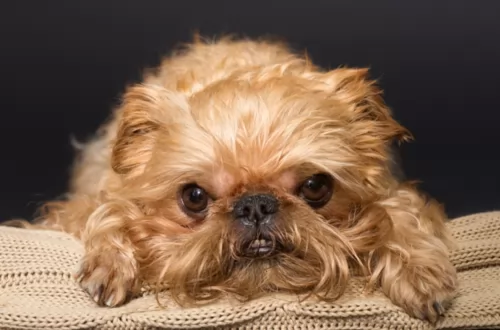 The Brug or Griffon Pug is not a purebred dog at this point in time. It is a cross between a Pug and a Brussels Griffon, currently known as a “designer dog” or a hybrid. This hybrid is really rare at this time but growing in popularity and breeders. Its exact history or original development is unknown at this time and needs to be researched as the hybrid develops into a breed, or breed clubs are formed. If you like either of the two breeds involved, you are sure to like the Brug. They are obviously not recognized by the major kennel clubs, but they are registered with a variety of hybrid/designer dog clubs. These include:
The Brug or Griffon Pug is not a purebred dog at this point in time. It is a cross between a Pug and a Brussels Griffon, currently known as a “designer dog” or a hybrid. This hybrid is really rare at this time but growing in popularity and breeders. Its exact history or original development is unknown at this time and needs to be researched as the hybrid develops into a breed, or breed clubs are formed. If you like either of the two breeds involved, you are sure to like the Brug. They are obviously not recognized by the major kennel clubs, but they are registered with a variety of hybrid/designer dog clubs. These include:
 This is a medium to large dog that sports a dark blue and white coat which is densely mottled or ticked. The Bluetick Coonhound’s coat can be described as tri-colored, and the dog’s head and ears are essentially black. He can also have tan markings on the chest, below the tail, around the muzzle and over the eyes. The dog is muscular and athletic and weighs from 25 to 36kg. Typically of the Hound breed, he has a sad but amicable expression on his face.
This is a medium to large dog that sports a dark blue and white coat which is densely mottled or ticked. The Bluetick Coonhound’s coat can be described as tri-colored, and the dog’s head and ears are essentially black. He can also have tan markings on the chest, below the tail, around the muzzle and over the eyes. The dog is muscular and athletic and weighs from 25 to 36kg. Typically of the Hound breed, he has a sad but amicable expression on his face.
The Bluetick Coonhound is an intelligent dog and once he has been trained and socialized, he becomes a wonderful member of the family, getting on well with children and other pets He will need plenty of companionship from his human family as well as exercise, and isn’t a dog that you can just have stuck away in your back garden. A Bluetick needs plenty of companionship and activity to be happy.
Friendly and social, this is a vocal dog, given to baying, barking and howling. He’s a scenthound, so when you take him for a walk, which is essential for his exercise needs, you may need him on a leash as he can get scent of something and just be off. You’ll also need to ensure you have a fenced yard as he looks for ways to get out to follow a scent.
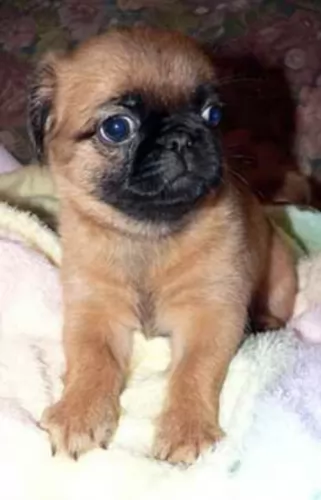 Like its two parental breeds, the Brug is a smaller sized dog – both parents are lab dogs and so is the Brug. Because they are hybrids, Brugs can be very different in appearance but most seem to have large eyes, squishy faces, black masks, fluffy hair, long black whiskers, short fluffy hair, flat ears and a fluffy tail. They could be in any of a number of colors including fawn, black, cream or apricot.
Like its two parental breeds, the Brug is a smaller sized dog – both parents are lab dogs and so is the Brug. Because they are hybrids, Brugs can be very different in appearance but most seem to have large eyes, squishy faces, black masks, fluffy hair, long black whiskers, short fluffy hair, flat ears and a fluffy tail. They could be in any of a number of colors including fawn, black, cream or apricot.
 The Bluetick Coonhound is an affectionate dog who will do well in the country, although he will adapt to city dwelling too. Wherever he is, he will need plenty of activities to keep him busy.
The Bluetick Coonhound is an affectionate dog who will do well in the country, although he will adapt to city dwelling too. Wherever he is, he will need plenty of activities to keep him busy.
People living on smaller properties may have reservations about keeping one, as his bark is loud and long winded, whereas a larger property would accommodate this characteristic better.
Your Bluetick can make a wonderful pet if he is trained and socialized. He is just like a big teddy bear who wants to be part of the family and receive his full portion of love and care like everyone else.
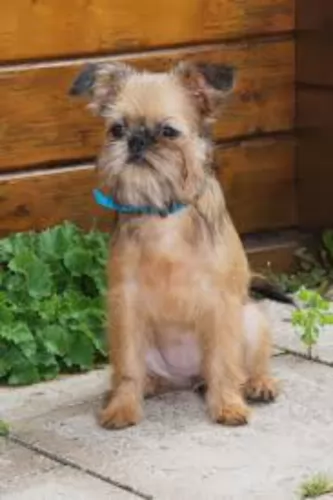 This hybrid is a loyal little dog. They are an affectionate lap dog that wants to be with his humans all the time. They have a very pleasant disposition and do well with children and other dogs. They might be shy to begin with but will warm up to affection. However, they are willful and self-important at times. This is tempered by their great sense of humor and empathy to its peoples’ moods. Left alone too long, they will tend to bark excessively.
This hybrid is a loyal little dog. They are an affectionate lap dog that wants to be with his humans all the time. They have a very pleasant disposition and do well with children and other dogs. They might be shy to begin with but will warm up to affection. However, they are willful and self-important at times. This is tempered by their great sense of humor and empathy to its peoples’ moods. Left alone too long, they will tend to bark excessively.
 You won’t battle with too many vet’s fees for your Bluetick Coonhound as he is a healthy breed. Just like with other dogs, especially in larger dogs, watch out for hip and elbow dysplasia.
You won’t battle with too many vet’s fees for your Bluetick Coonhound as he is a healthy breed. Just like with other dogs, especially in larger dogs, watch out for hip and elbow dysplasia.
If you do research you’ll find that quite a few Coonhounds can be affected. It is when the hip or elbow socket is malformed. Check your pet because it can lead to painful arthritis and can cause lameness.
Typical of Hounds, your Bluetick Coonhounds loves to eat, and this is precisely why he is prone to over-eating if you allow him to. Watch your dog’s weight and don’t allow him to overeat as overeating suppresses the immune system, resulting in illness.
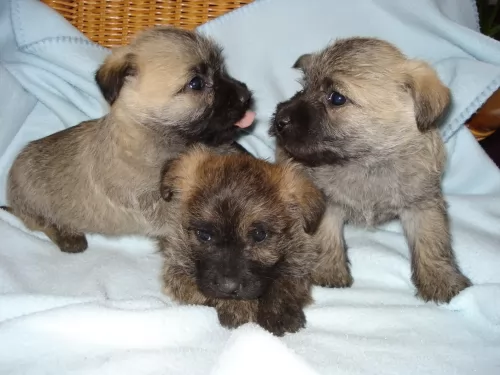 Usually the hybrid dog can have better health than either of the parents. This is true with the Brug as well, but there are also some issues they may inherit from the parents or face simply because of their size and complexion. These include:
Usually the hybrid dog can have better health than either of the parents. This is true with the Brug as well, but there are also some issues they may inherit from the parents or face simply because of their size and complexion. These include:
 The puppy Bluetick will require 4 meals a day. Your adult Bluetick will require one or two bowls of food a day. This food can be your own home-made brand which includes rice, meat and vegetables or it should be a high quality commercially manufactured dog food. If you’re in any doubt as to what kind of dog food to be providing for your Bluetick Coonhound, rather speak to your vet as you want to ensure your pet is getting in his vitamins and minerals.
The puppy Bluetick will require 4 meals a day. Your adult Bluetick will require one or two bowls of food a day. This food can be your own home-made brand which includes rice, meat and vegetables or it should be a high quality commercially manufactured dog food. If you’re in any doubt as to what kind of dog food to be providing for your Bluetick Coonhound, rather speak to your vet as you want to ensure your pet is getting in his vitamins and minerals.
Good nutrition is essential to the health and wellbeing of your dog. It is important that he receive raw meat in his diet from time to time as well as a supplement with essential fatty acids to keep his health and skin in tip top condition. He should never ever be without a steady source of fresh, cool water.
When it comes to grooming, an occasional brushing will suffice. The dog has a short coat but it is dense and it sheds throughout the year. Use a brush on him to get rid of loose hairs and to keep his coat soft and shiny.
Active Hound breeds are prone to ticks and fleas so check your dog regularly for these parasites.
The medium length floppy ears will need to be checked. You can always check with your veterinarian for ear cleaning products and how to use them. Never prod around in your dog’s ears, trying to clean them, as this can lead to damage.
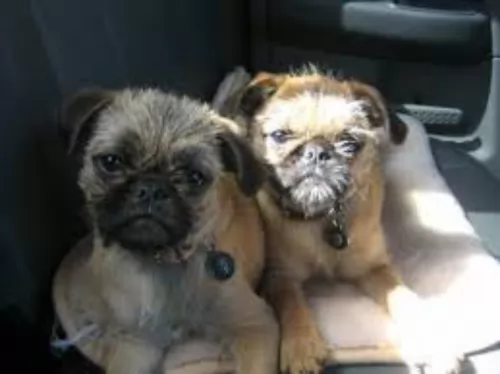 Don’t let this dog get overweight. Feed a high quality dry food intended for small or toy dogs. One fourth to one half of a cup per day in two separate meals is what is recommended.
Don’t let this dog get overweight. Feed a high quality dry food intended for small or toy dogs. One fourth to one half of a cup per day in two separate meals is what is recommended.
Patella Luxation or slipped knee caps – small dogs often have this issue. The patella is the knee cap and layman often called it a slipped knee cap, but it is also called slipped stifles. The femur, the tibia and the patella do not line up and this causes an abnormal gait or even lameness. Puppies are born with this, but it does not exhibit symptoms until years later. Arthritis is the most common result. Occasionally surgery is required.
Eye Issues – Cherry eye, a genetic disease, as well as irritation from air borne particles, allergies or scratches.
Skin Allergies – They can have skin allergies so watch for excessive licking or scratching.
Breathing Issues – Asthma and respiratory issues are common among small dogs with these types of faces.
Like their 2 breed parents, the Brug is a small but energetic hybrid. They need to play and run on a daily basis. Leash walks are good, but they need a yard or dog park as well. They are athletic little dogs and are good at tracking, obedience and agility. You cannot force them to do an activity but if its fun they will jump right in.